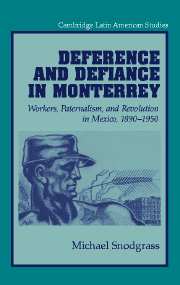Book contents
- Frontmatter
- Contents
- Acknowledgments
- Introduction
- 1 Porfirian Progress in “Mexico's Chicago”
- 2 Revolution Comes to Monterrey
- 3 Work, Gender, and Paternalism at the Cuauhtémoc Brewery
- 4 Making Steel and Forging Men at the Fundidora
- 5 The Democratic Principles of Our Revolution: Labor Movements and Labor Law in the 1920s
- 6 Every Class Has Its Leaders: ASARCO, The Great Depression, and Popular Protest in Monterrey
- 7 Stay with the Company or Go with the Reds
- 8 State Your Position!: Conservatives, Communists, and Cardenismo
- 9 The Quotas of Power: Organized Labor and the Politics of Consensus
- 10 The Persistence of Paternalism
- 11 The Institutionalized Revolution
- Select Bibliography of Primary Sources
- Index
8 - State Your Position!: Conservatives, Communists, and Cardenismo
Published online by Cambridge University Press: 19 August 2009
- Frontmatter
- Contents
- Acknowledgments
- Introduction
- 1 Porfirian Progress in “Mexico's Chicago”
- 2 Revolution Comes to Monterrey
- 3 Work, Gender, and Paternalism at the Cuauhtémoc Brewery
- 4 Making Steel and Forging Men at the Fundidora
- 5 The Democratic Principles of Our Revolution: Labor Movements and Labor Law in the 1920s
- 6 Every Class Has Its Leaders: ASARCO, The Great Depression, and Popular Protest in Monterrey
- 7 Stay with the Company or Go with the Reds
- 8 State Your Position!: Conservatives, Communists, and Cardenismo
- 9 The Quotas of Power: Organized Labor and the Politics of Consensus
- 10 The Persistence of Paternalism
- 11 The Institutionalized Revolution
- Select Bibliography of Primary Sources
- Index
Summary
Workers were not the only regiomontanos taking to the streets in 1936. The industrialists voiced their agenda in the public sphere as well. And the sudden mobilization of well-to-do regiomontanos proved far more conspicuous then the labor rallies to which Monterrey had grown accustomed. That, of course, was the businessmen's intent: to reaffirm their social prominence and rally the locals to their cause. While their industries boomed, their political fortunes had tumbled. They rightly perceived a broad, cross-class challenge to their local power from militant unionists, their middle-class allies, and political authorities in Mexico City. Moreover, the business leaders' once agreeable allies in Nuevo León's government now endorsed organized labor. Most important, they had seemingly lost control over their own workers. They therefore refined their strategies of resistance. Six months prior to the Vidriera strike, Monterrey's industrialists and merchants had organized their own “united front against the labor element.” They used their influence over the Mexican media to enlist nationwide support for their struggle against unionism, one that built upon a red-baiting, patriotic discourse that would resonate at home and in provincial Mexico as well. They then integrated thousands of local supporters into a social movement meant to defend the regiomontano way of life from the threat of an intrusive federal government.
This conservative defiance exemplified the “multifaceted and sophisticated … 1930s Right” analyzed by John Sherman. Sherman's seminal study emphasizes why Mexico's urban middle classes emerged as a social base of resistance to the revolutionary government.
- Type
- Chapter
- Information
- Deference and Defiance in MonterreyWorkers, Paternalism, and Revolution in Mexico, 1890–1950, pp. 202 - 228Publisher: Cambridge University PressPrint publication year: 2003



